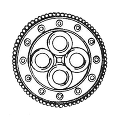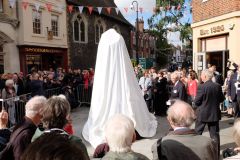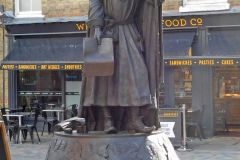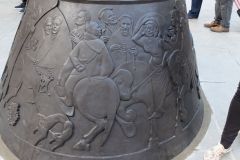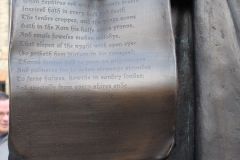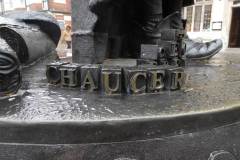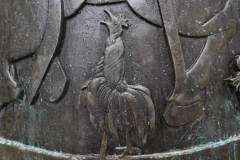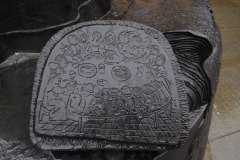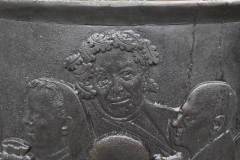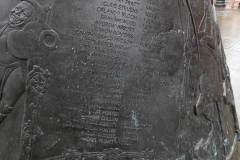12 October 2016 brought a major extension to the city’s statuary (Image 1). A larger than life statue of Geoffrey Chaucer, dressed as a Canterbury pilgrim, was unveiled on the corner of Best Lane and the High Street. The sculptor of the Chaucer figure was Kent-based Sam Holland ARBS, whilst the designer of the large plinth, sculpted in bas-relief, was Yorkshire-based Lynn O’Dowd.
The £200,000 cost of the statue was met through fundraising, donations, grants and sponsorship of each of the 30 characters depicted on the plinth. Each character appears in the Canterbury Tales but is also linked to (and here depicted as) a local person.
Points to note:
- The 2 metre high statue was unveiled by Simon Armitage, Professor of Poetry at Oxford University and at the University of Sheffield (Image 1)
- Chaucer faces the Eastbridge Hospital, where many pilgrims heading for the cathedral spent the night (Image 2)
- The large plinth, 7 metres in length, takes the form of a horse’s foot and shows images relating the the Canterbury Tales (Image 3)
- Chaucer holds the writing on vellum of the opening text of the Canterbury Tales (Image 4)
- Reminding us that Canterbury Tales became one of the first printed books, the printers’ blocks for Chaucer’s name appear on the top of the plinth (Image 5)
- Chanticleer, the proud rooster mentioned in the Nun’s Priest’s Tale, can also be found on the side of the plinth (Image 6)
- Chaucer wears around his neck an astrolabe (early navigation instrument) – he wrote a guide to how these should be used (Image 7)
- A depiction of the Tabard Inn in Southwark also appears on the plinth – at a height ideal for those who wish to try ‘brass rubbing’ (Image 8)
- An example of the 30 story tellers depicted on the plinth is the Summoner (an official in the ecclesiastical courts) (Image 9) – according to Chaucer’s General Prologue to the Tales, the Summoner was often drunk and had a face covered with pimples and unsightly pustules
- Finally, the side of the plinth shows a list of sponsors (Image 10).
The statue, thought to be the only Chaucer statue in England, is the result of a ten year project led by Canterbury Commemoration Society. The Society’s earlier project, statues of King Ethelbert and Queen Bertha, can be seen in Lady Wootton’s Green.
Sources: Commemorative booklet Chaucer the Pilgrim Poet published by the Canterbury Commemoration Society, 2016; also website http://www.chaucerstatuecanterbury.org/
